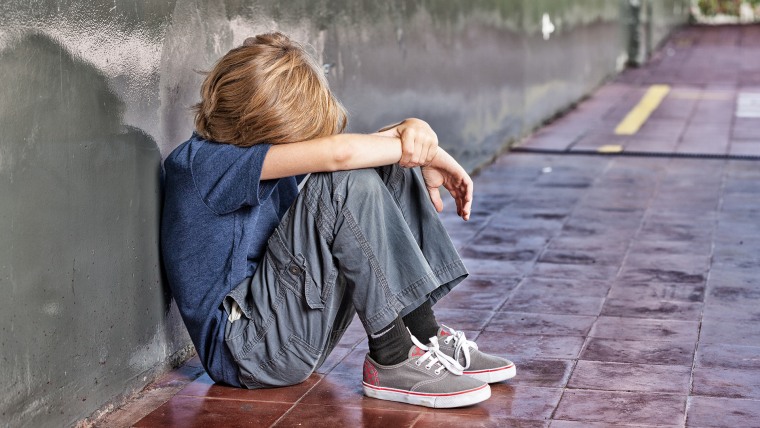Though it's not uncommon for a child to remain silent about being bullied by a schoolmate, Dr. Meg Meeker, author of "12 Principals of Raising Great Kids," says there are several signs that can clue parents in to a bullying issue.
As a pediatrician who has been treating children for more than 30 years, Meeker says she has seen an increase in bullying incidents recently, causing her to work diligently to alert parents of the signs of bullying.
RELATED: Dad fights back against daughters' bullies ... with body-positive rap
"Kids today have many avenues through which they can bully," Meeker told TODAY Parents. "It doesn't happen just on the playground. It happens on the Internet. It happens in the bathroom. And, bullies are excellent at doing things when no one else is around to see."
"Even though we say, 'Make sure to tell somebody,' kids don't speak up easily. It usually has gone on for several months before parents find out."
In a recent blog post, Meeker shared five signs parents can look for if they are concerned their child is being bullied.

1. Unwillingness to go to school
"It's normal for kids not to want to start school in the fall or after winter break," said Meeker. "What isn't normal is after you've been in school for eight or ten weeks and the child has been happy and all of a sudden, he's having stomach aches and he doesn't want to go to school."
Meeker encourages parents to watch their children carefully — if a child has frequent stomach aches or headaches that keep them from attending school, there may be a bigger problem at play.
"Their body language is going to tell you they're really pretty miserable. But, overall, if your kids are pretty happy and they're chatting about their school day during dinner — you're probably in pretty good shape."
2. Change in demeanor
In addition to physical symptoms, Meeker says a change in a child's emotional behavior can signal a problem. Parents should observe their child's mood after school, paying attention to whether or not they come home in a cheerful mood.
"I really do think if you know your kids well, you read their facial expressions and you see what their demeanor is like," said Meeker. "Are they having trouble going to sleep? Are they waking up in the night? Are they just not doing well overall? Their body language will tell you, 'Mom, something is really wrong here.'"
3. Change in sleep patterns
"They're worrying about getting picked on at school the next day, so they don't want to go to sleep," said Meeker, adding that nightmares, refusing to get out of bed in the morning and waking several times at night could also be signs that your child is anxious as a result of being bullied.
4. Change in grades
If your child typically does well in school, but you notice her grades starting to change, this could be a sign of a problem as kids who are being bullied often have trouble staying focused on their schoolwork, says Meeker.
"This isn't just, 'Gee, I hate my math teacher,' said Meeker. "It's bigger than that."
RELATED: Teacher uses apples to deliver a powerful lesson about bullying
5. Shift in friends
While it's normal for kids to have new friends from time-to-time, Meeker says parents should watch out for signs that their child has no friends — complaining about eating lunch alone or remarking that friends they used to play with after school no longer want to come over, for example.
"Kids always have a new best friend every-other-day, but as long as they're saying they have best friends, you're in good shape," said Meeker. "What you worry about is kids coming home saying, 'Nobody likes me.' Bullies like to isolate their victims and cut them out of the pack."

Fortunately, Meeker says there are steps parents can take to both prevent bullying and help their child who is being bullied.
Be proactive
Meeker says it's important to have conversations with your kids about bullies and inappropriate behavior early on, and to teach your own kids to be respectful and have empathy, even when someone is mean to them.
"Teach them what healthy, respectful behavior looks like from another child their age. Teach them what non-healthy, disrespectful behavior looks like, too," said Meeker. "Make sure they know what the standard is, and then make sure they know it's important to talk to you about those mean or nasty behaviors when they encounter them."
Meeker says kids often avoid telling their parents about bullying because they are afraid or ashamed. To make your child more likely to talk about bullies with you, speak frankly abut the feelings of embarrassment or shame they may feel when bullied, share examples of bullying from your own life, and encourage them to talk about their feelings with you and your partner.
The author also suggests reminding your children to look out for their friends, taking notice of bullies mistreating others as well.
Take charge
When dealing with a bully, Meeker says parents should move from talking with the teacher, to the principal, to the parent.
When beginning with your child's teacher, ask for their help in looking out for bullying behaviors, being sure to note specific places — such as the lunch line or the playground — where the inappropriate behavior takes place.
If a teacher is unwilling to get involved, Meeker suggests approaching the school principal next for assistance.
After exhausting both options at the school, Meeker suggests meeting with the other child's parent, cautioning that parents choose to meet in a neutral location, be diplomatic, and not sound accusing.
Never miss a parenting story with TODAY’s newsletters! Sign up here
"Don't immediately put them on the defensive," said Meeker. "Say, 'Our kids are having problems — what can we do to help them get along better?'"
In the end, Meeker says the most important thing is to keep your own child healthy and safe.
"I've had times when parents have had to yank their kid from a school when nobody would confront the bully," said Meeker. "But you have to keep your kid safe."